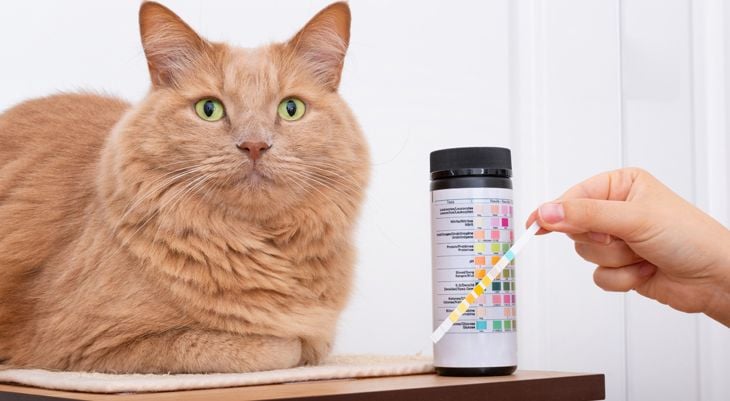
Diabetes mellitus is a common disease in which a cat’s body does not make enough insulin or has difficulty using it. This hormone is produced in the pancreas. Its job is to help move glucose from the bloodstream into the body’s cells to provide them with a source of energy.
Many cats with diabetes require lifelong care. This may include twice daily injections of insulin and careful monitoring of its diet, water intake and sugar levels in the blood and urine. However, once you and your feline veterinarian have determined the best treatment, your diabetic cat can still have many healthy years ahead of it.
The Role of Insulin in the Body
During digestion, food eaten by a cat is broken down into carbohydrates, fats and proteins. Carbohydrates can be broken down into smaller molecules. One of these is glucose, a type of sugar molecule. Every cell in the body needs glucose in order to survive.
When the body does not have enough insulin or if it cannot use this hormone properly, not enough glucose reaches the cells. The body then starts to break down protein and fat to make energy. This can cause a cat to lose weight, even though its appetite increases at the same time.
With the onset of diabetes, sugar that cannot reach the cells stays in the bloodstream. This leads to high blood sugar, one of the signs of diabetes. Some of the sugar in the blood also ends up in the urine. When there is sugar in the urine, a cat will often urinate and drink more frequently.
Types of Diabetes Mellitus
There are two types of diabetes that affect cats:
- Type 1 diabetes (insulin-dependent diabetes mellitus). Up to three-quarters of cats with diabetes have this type. In this type, the pancreas does not produce enough insulin, so cats will require daily injections of this hormone.
- Type 2 diabetes (non-insulin-dependent diabetes mellitus). In this type, the cells in a cat’s body no longer respond to insulin, or the body stops making enough of this hormone. This type can be treated with diet, oral medications or insulin injections.
Diabetes can affect any cat, but is more common in older, obese cats. The exact cause of the disease is unknown; although obesity increases a cat’s risk of developing diabetes. Other diseases and medications may also be connected to diabetes.
Diagnosis of Diabetes Mellitus
A cat with diabetes requires immediate treatment. Without it, a cat may die at a younger age. Your veterinarian will use several things to determine if your cat has diabetes, including:
- Presence of the four common signs of diabetes: increased appetite, weight loss, increased urination and excessive thirst
- Physical examination
- Blood and urine tests for high levels of sugar
Untreated diabetes can lead to ketoacidosis, a condition that is sometimes fatal. A cat that reaches this stage of diabetes will require immediate intensive care, including injections of insulin and fluid therapy.
Cats with an abnormally high blood sugar level can also develop diabetic neuropathy. This condition affects the nerves, such as those in the hind legs. Cats may have difficulty jumping or walking.
Treatments for Diabetes Mellitus
The goal of every treatment for diabetes is to keep a cat’s blood sugar level within a normal range for as much of the day as possible. This will reduce the risk of the cat developing problems such as ketoacidosis or diabetic neuropathy.
Treatment for feline diabetes depends upon the type of diabetes a cat has. Also, each cat’s treatment will be tailored to match its blood sugar levels and how well it responds to insulin. Some cats’ diabetes may improve over time and require fewer treatments. Other cats will need treatment for the rest of their lives. All cats with diabetes will require regular checks of their blood and urine glucose levels.
Treatments for feline diabetes may include:
- Insulin injections. Most cats are given insulin injections under the skin two times a day, ideally at the same time each day. Your veterinarian will determine the best type of insulin, frequency of injection and proper dose for your cat. These injections can be given under the skin, and cats generally tolerate this well. If a cat is given too much insulin, it can develop dangerously low blood sugar (hypoglycemia).
- Oral medications. Glipizide is a medication given orally that lowers the level of glucose in the blood. The side effects of this drug include loss of appetite, vomiting and liver damage. This drug may not work for all cats. It can also be difficult to give this drug daily over a long time to some cats.
- Diet. A cat’s diet plays an important role in treating its diabetes. Obesity can affect how well the body responds to insulin. Your veterinarian can provide you advice on the best diet to help your cat lose weight gradually. Even diabetic cats that are at a healthy weight may benefit from a diet that is lower in carbohydrates. Diabetic cats should also be fed at the same time as their insulin injections are administered rather than free-fed throughout the day.
If you cat exhibits diabetic symptoms or has higher risk factors, contact us today, so we can examine your cat and provide appropriate treatment options.
